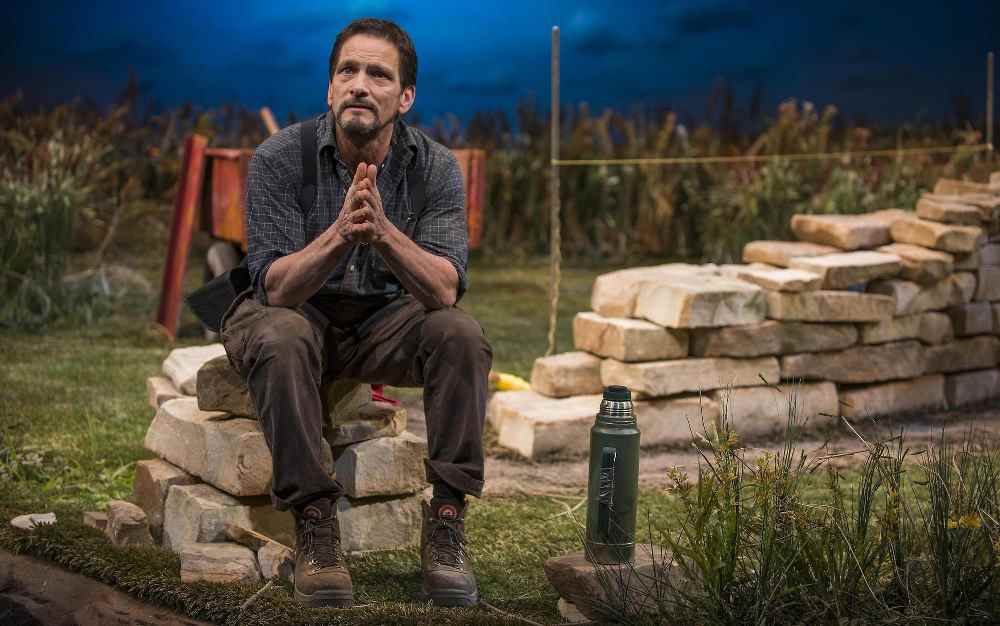This spring, Milwaukee Repertory Theater and the Zeidler Center for Public Discussion partnered to create “Act II”—small, group-facilitated conversations after performances of the world premiere of American Song, an 80-minute play by Joanna Murray-Smith about the parent (played by James Devita) whose son perpetrates a school shooting. After each performance, a community member would respond with a short reflection about the play from the stage, after which participants were invited to join trained Zeidler facilitators in one of many small circles of chairs arranged throughout the lobby directly outside the theatre. There the topic of discussions ranged from the macro issues of gun control and mental health care in America to personal stories about gun violence. In all, Zeidler facilitators led more than 3,000 audience members in more than 450 small group circles for reflective, structured dialogue.
Below is a dialogue between Dr. Katherine Wilson, executive director of the Zeidler Center, and Leda Hoffmann, director of community engagement at Milwaukee Rep, as they reflect on the conversations that transpired during Act II, which ran concurrent with the production of American Song, March 15-April 10.
Katherine Wilson: What made you think to reach out to me about working together?
Leda Hoffmann: In the fall, I attend the Zeidler Center’s community dialogue on the themes of whiteness and privilege. The style of dialogue struck me with the Zeidler Center’s ability to get people talking about difficult subjects. With the creation of Milwaukee Rep’s new community engagement department, and heading into our world premiere of American Song, I was eager to find ways that we could expand beyond the tradition talkbacks; the Zeidler Center seemed like the perfect fit. For people who have never been a part of a facilitated dialogue, how do you describe these kinds of conversations?
Wilson: In some ways, you’ve got to experience it to fully understand the power of reflective, structured dialogue. Zeidler dialogues rely on some simple but not simplistic tools to create a safe space for people to listen deeply and speak from the heart. Those tools include giving time for reflection, asking non-polarizing questions, and the use of structured go-arounds. Each circle is also led by one of our facilitators trained to handle complex conversations about our most difficult issues. As one participant remarked, “We don’t often get to meet others who are different from us, but are willing to be vulnerable.”
Hoffmann: Did you find that audiences at Milwaukee Rep were willing to be vulnerable?
Wilson: Absolutely. People were able to share incredibly personal experiences because the dialogue method works to create a safe space. Facilitated go-arounds have a powerful rhythm to them. Zeidler facilitators ask a question, then people sit in silence and jot down notes about what they’d like to say. This time gives people a chance to reflect before anyone speaks. When the go-around starts, people tend to listen more fully to others when they’ve had the chance to reflect. And that’s one of the main goals: deep listening. During the go-around, one person speaks at a time without interruption. And after each person finishes, there’s silence. “Two cleansing breaths” is how Ahmad Muhammad, one of our facilitators, describes the silent pause. It’s an intentionally slow way to have a conversation. From a theatre person’s point of view, what do you think made Act II different from traditional talkbacks?
Hoffmann: It is a whole new way of sharing experiences after a play. As opposed to traditional talkbacks in which only a few, usually extroverted audience members have the chance to speak, Zeidler dialogues give everyone the equal time and opportunity to talk. And instead of focusing on actors or production elements, we specifically worked to make the conversation about the themes of the play. By moving the audience to small circles of chairs in the lobby, we moved the conversation from the play itself and to the larger societal conversation the play inspires.
Wilson: Logistically we took a risk that audience members would be brave enough to sit down in small circles with strangers to have a conversation about incredibly polarizing issues that ranged across gun control, parenting, violent crime, education, mental illness, and the fractured nature of today’s society.
Hoffmann: I’m so glad we took that risk. We got people out of their known talkback comfort zones and created new dynamic yet safe spaces—places where people really did want to stay past our 45-minute end time to keep talking! Lots of people are now asking if we can do this after every production. Just a couple weeks ago, we received this note from a subscriber who attended the play:
Thank you for doing American Song. And more importantly, Act II. Besides being riveted by Jim’s performance, I listened to strangers’ stories of a suicide and a tragic accident in their younger years. These strangers-turned-neighbors became the people I could now pray for; they now had a face and name; you started the process of our commonality. In my 25-plus years of attending the Rep, this had the most impact. Thank you to ALL those involved.
Wilson: Building bridges with strangers is one of the benefits we at the Zeidler Center constantly hear from participants. It’s a very different way to have a conversation—one that’s focused on humanizing the other. Another Rep patron reported that the dialogue “forced me to think about and discuss the issues that I might have otherwise squelched,” and, “We had a wonderful diverse group who shared experiences, not just opinions.”
Hoffmann: The Zeidler Center hosts dialogues all the time. How do you think the tone of the dialogues changed to have a play in front of them?
Wilson: The audience had a shared experience going into the dialogues. The play absolutely set the tone for the conversations, as together the audience witnessed the character’s raw emotions about one of our worst nightmares. The play touched on so many issues, but it didn’t preach a specific stance or give easy answers. Audience members had a powerful, shared reference point but were able to take the conversation in many different directions, depending on their personal experiences.
Hoffmann: We also invited community leaders—a different person at each of the 33 performances—who represented a variety of perspectives from politicians, police officers, gun lobbyists from both sides, and community members who work with or have personally experienced trauma associated with gun violence. Following the performance, the responder for that performance gave a 5-minute response to the end of the play. How do you think the responders influenced the conversation?
Wilson: Facilitators did report that the responders influenced the dialogues, whether they were holding a fake gun onstage or talking about their experience of the Sikh temple shooting. It was also interested for the participants who got to have a responder in their small group. There’s something equalizing about everyone getting the same time to share their personal stories, from the mayor who stayed for my small group to a teen audience member who shared her experience about seeing her brother die from a gunshot wound on the street in front of her.

Hoffmann: I keep hearing from people who came away from the dialogues surprised that when they thought that they wouldn’t hear anything new, there was a rich diversity of viewpoints—and that people with differing viewpoints could have a civil conversation. Others who felt alone found a community they didn’t know existed. A woman who initially said, “I don’t think these are my peeps,” told us at the end that that wasn’t true. Using Zeidler Center dialogues makes a world of difference to expand the people willing to share their stories, and to enrich the quality of conversation. American Song is a play that asks questions about the fractured nature of society. There’s a line about how there is “no unified song.” How fitting, then, that we sought to find a unified song with the dialogues.
Wilson: I think when we start talking about unity, we can mistake it for consensus and even censoring of difference. Zeidler dialogues allow for a deeper kind of unity—one that provides a safe structure for people to maintain community even though they may disagree on issues. In the face of our deepest community challenges, I hear people constantly say they want “less talk and more action.” I understand the frustration with toxic, ineffectual talk that doesn’t go anywhere. At the same time, I want to distinguish talk from facilitated dialogue–a kind of interaction that has embedded within it powerful actions: humanizing and building trust across boundaries, listening deeply, and speaking from the heart. One patron said, “I believe our society lacks opportunities for these important conversations.” I’m excited about the possibilities of this partnership between the Zeidler Center and the Milwaukee Repertory Theater to provide those opportunities.
Hoffmann: This was our first big community engagement experiment. Could a theatre be a place where civic leaders and patrons came to respectfully debate some of today’s most divisive issues? Could we use a new play to launch a citywide conversation? Could we move hundreds of patrons into small discussion groups spread out all over our lobbies nightly, and would our audiences participate in the process? The answer is resoundingly yes—and we couldn’t be happier with the results. As one patron commented, “These discussions allow for discourse between demographics that would not otherwise happen.” I’m looking forward to these conversations growing and evolving as we focus on increasing the diversity of perspectives with curated conversations in connection with our production of Disgraced next season.


